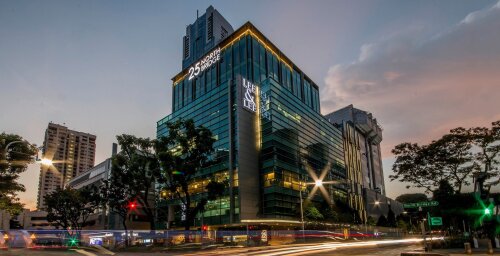Best Public-Private Partnerships (PPP) Lawyers in City Hall
Share your needs with us, get contacted by law firms.
Free. Takes 2 min.
List of the best lawyers in City Hall, Singapore
About Public-Private Partnerships (PPP) Law in City Hall, Singapore
Public-Private Partnerships, commonly referred to as PPP, are collaborative agreements between public sector entities, such as government agencies based in City Hall, Singapore, and private-sector companies. These partnerships are designed to finance, construct, and operate projects or services that serve the public interest. In City Hall, PPPs are frequently used for infrastructural developments, urban renewal projects, transport networks, public utilities, and social services. The legal framework surrounding PPPs ensures accountability, transparency, and fair risk allocation between stakeholders.
Why You May Need a Lawyer
Navigating the PPP process in City Hall, Singapore can be complex due to the intricate requirements, multi-party contracts, and substantial financial and legal risks involved. Here are some common situations where engaging a lawyer is advisable:
- Reviewing and negotiating PPP contracts to protect your interests.
- Ensuring compliance with local regulatory and tendering processes.
- Handling disputes or breaches in PPP agreements.
- Advising on financing, intellectual property, and asset transfer issues.
- Assisting with the bidding process, consortium agreements, or public tenders.
- Managing project delivery, performance guarantees, and handback arrangements.
- Counseling on legal liabilities, regulatory approvals, or ongoing compliance obligations.
Local Laws Overview
City Hall, situated within Singapore's core administrative and business district, observes the country's comprehensive legal framework governing PPPs. Key aspects include:
- Adherence to the Infrastructure Protection Act, Building and Construction Industry laws, and sector-specific regulations.
- Use of the Public Sector (Governance) Act, which outlines the obligations and accountability of government agencies when entering PPPs.
- Mandatory public procurement principles, such as transparency, value for money, and non-discriminatory practices, under the Government Procurement Act and relevant subsidiary legislation.
- Sectoral regulators, like the Land Transport Authority or Urban Redevelopment Authority, may impose additional requirements for specific projects.
- All PPPs are subject to oversight by central agencies including the Ministry of Finance, which issues guidelines and standard forms for PPP contracting and project management.
- Compliance with anti-corruption laws, especially the Prevention of Corruption Act, is strictly enforced.
Thorough legal guidance is essential to navigating these intersecting requirements and to safeguard the interests of all parties involved in PPP projects.
Frequently Asked Questions
What is a Public-Private Partnership (PPP) in City Hall, Singapore?
A PPP is a collaborative arrangement where a government agency, based in City Hall or elsewhere in Singapore, partners with private sector entities to develop, finance, operate, or maintain public infrastructure or services.
What types of projects are usually handled through PPPs in City Hall?
PPPs commonly involve large-scale infrastructure such as transport facilities, government buildings, public housing, utilities, information technology systems, and social service delivery hubs.
How are PPP contracts awarded in Singapore?
PPP contracts are generally awarded through public tenders, which follow open, fair, and transparent procurement guidelines set out under Singapore law.
What are the key risks involved in PPP agreements?
Key risks include financial exposure, construction or operation delays, regulatory changes, unforeseen costs, and potential disputes between the public and private stakeholders.
Do I need a lawyer for PPP projects?
Yes, due to the complexity and length of PPP contracts, legal representation is strongly recommended for contract review, negotiation, due diligence, and compliance advice.
Are there any restrictions on foreign companies partnering with the government?
While foreign companies can participate in PPPs, they must adhere to national security considerations, sector-specific restrictions, and may have to appoint local partners or representatives depending on the project.
What happens if there is a dispute in a PPP contract?
Disputes are typically addressed through mechanisms specified in the contract, often involving negotiation, mediation, arbitration, or litigation under Singapore law.
How are risks and responsibilities allocated in PPP agreements?
Risks and responsibilities are typically allocated to the partner best able to manage them, ensuring optimal efficiency and accountability throughout the project lifecycle.
Are PPP agreements in City Hall subject to public oversight?
Yes, PPP agreements are subject to oversight by government agencies, parliamentary scrutiny, audit bodies, and may also undergo periodic public consultation processes.
What is the process for terminating a PPP agreement early?
Early termination can occur due to default, force majeure, or mutual agreement, following the terms set out in the contract. Legal advice is needed to navigate potential compensation and asset transfer obligations.
Additional Resources
When seeking more information or support on PPPs in City Hall, Singapore, consider these resources:
- The Ministry of Finance Singapore - For official PPP guidelines and policy updates.
- Singapore Government Procurement Portal - For information on ongoing and upcoming PPP tenders.
- Urban Redevelopment Authority - For regulations affecting urban infrastructure PPPs in City Hall.
- Land Transport Authority Singapore - For transport-infrastructure PPPs.
- Singapore Mediation Centre - For dispute resolution services in PPP projects.
- Law Society of Singapore - To find qualified lawyers specializing in PPP law and public procurement.
- Building and Construction Authority (BCA) - For technical standards and requirements related to construction-based PPPs.
Next Steps
If you are considering involvement in a Public-Private Partnership in City Hall, Singapore, or require legal assistance, here are steps to follow:
- Identify the nature and scope of the PPP project you intend to participate in.
- Consult with a qualified lawyer with experience in PPP law and public procurement in Singapore.
- Gather all relevant project documentation, tenders, and correspondence to facilitate legal advice.
- Review the applicable legal and regulatory requirements in collaboration with your legal counsel.
- Participate in pre-bid consultations or industry briefings conducted by City Hall agencies.
- Ensure robust risk assessment and due diligence is conducted at every project stage.
- Stay updated with guidance or changes to PPP policies through official government channels.
Professional legal advice is essential to securing your interests and achieving successful outcomes in any PPP transaction in City Hall, Singapore.
Lawzana helps you find the best lawyers and law firms in City Hall through a curated and pre-screened list of qualified legal professionals. Our platform offers rankings and detailed profiles of attorneys and law firms, allowing you to compare based on practice areas, including Public-Private Partnerships (PPP), experience, and client feedback.
Each profile includes a description of the firm's areas of practice, client reviews, team members and partners, year of establishment, spoken languages, office locations, contact information, social media presence, and any published articles or resources. Most firms on our platform speak English and are experienced in both local and international legal matters.
Get a quote from top-rated law firms in City Hall, Singapore — quickly, securely, and without unnecessary hassle.
Disclaimer:
The information provided on this page is for general informational purposes only and does not constitute legal advice. While we strive to ensure the accuracy and relevance of the content, legal information may change over time, and interpretations of the law can vary. You should always consult with a qualified legal professional for advice specific to your situation.
We disclaim all liability for actions taken or not taken based on the content of this page. If you believe any information is incorrect or outdated, please contact us, and we will review and update it where appropriate.













